1
The complexities of adult life get in the way of the truth. The great philosophers have always been able to clear away the complexities and see simple distinctions - simple once they are stated, vastly difficult before. If we are to follow them we too must be childishly simple in our questions - and maturely wise in our replies.Mortimer J. Adler
2
Is it too much to expect from the schools that they train their students not only to interpret but to criticize; that is, to discriminate what is sound from error and falsehood, to suspend judgement if they are not convinced, or to judge with reason if they agree or disagree?Mortimer J. Adler
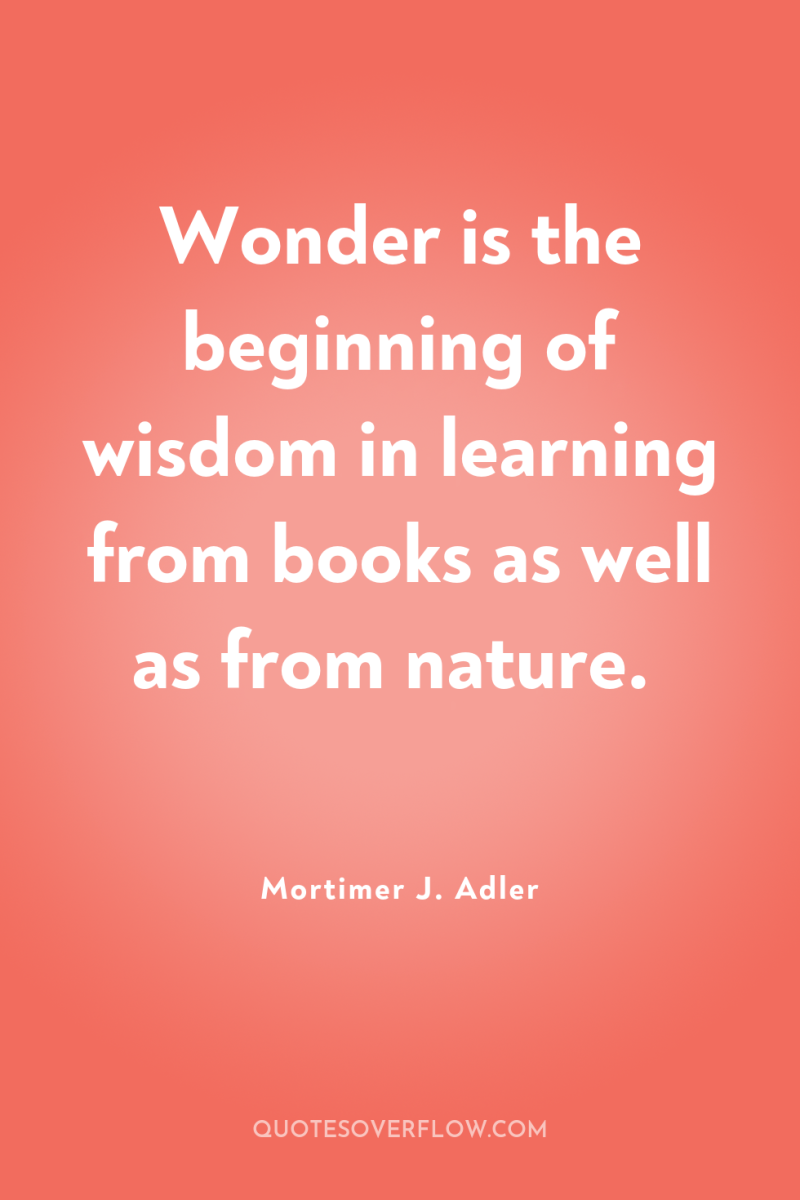
3
Wonder is the beginning of wisdom in learning from books as well as from nature.Mortimer J. Adler
4
There are genuine mysteries in the world that mark the limits of human knowing and thinking. Wisdom is fortified, not destroyed, by understanding its limitations. Ignorance does not make a fool as surely as self-deception.Mortimer J. Adler
5
....a good book can teach you about the world and about yourself. You learn more than how to read better; you also learn more about life. You become wiser. Not just more knowledgeable - books that provide nothing but information can produce that result. But wiser, in the sense that you are more deeply aware of the great and enduring truths of human life.Mortimer J. Adler
6
Television, radio, and all the sources of amusement and information that surround us in our daily lives are also artificial props. They can give us the impression that our minds are active, because we are required to react to stimuli from the outside. But the power of those external stimuli to keep us going is limited. They are like drugs. We grow used to them, and we continuously need more and more of them. Eventually, they have little or no effect. Then, if we lack resources within ourselves, we cease to grow intellectually, morally, and spiritually. And we we cease to grow, we begin to die.Mortimer J. Adler
7
The ability to retain a child's view of the world with at the same time a mature understanding of what it means to retain it, is extremely rare - and a person who has these qualities is likely to be able to contribute something really important to our thinking.Mortimer J. Adler
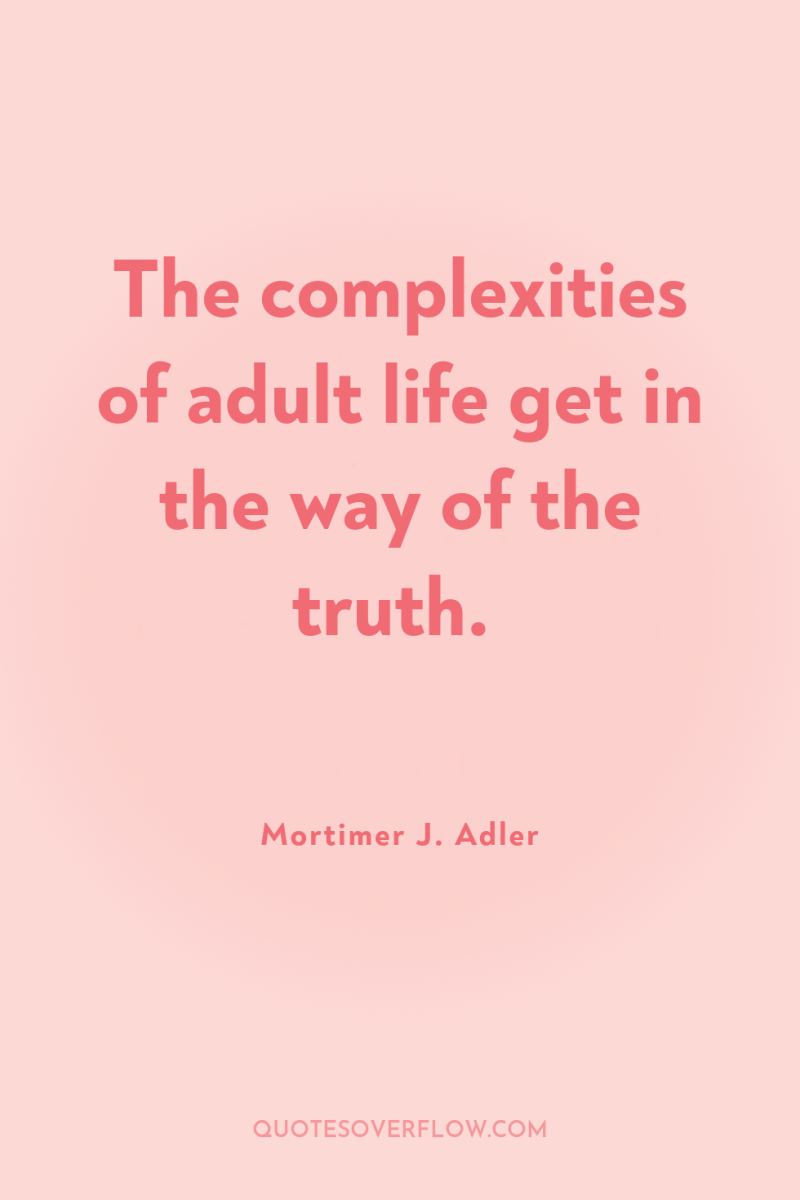
8
The complexities of adult life get in the way of the truth.Mortimer J. Adler
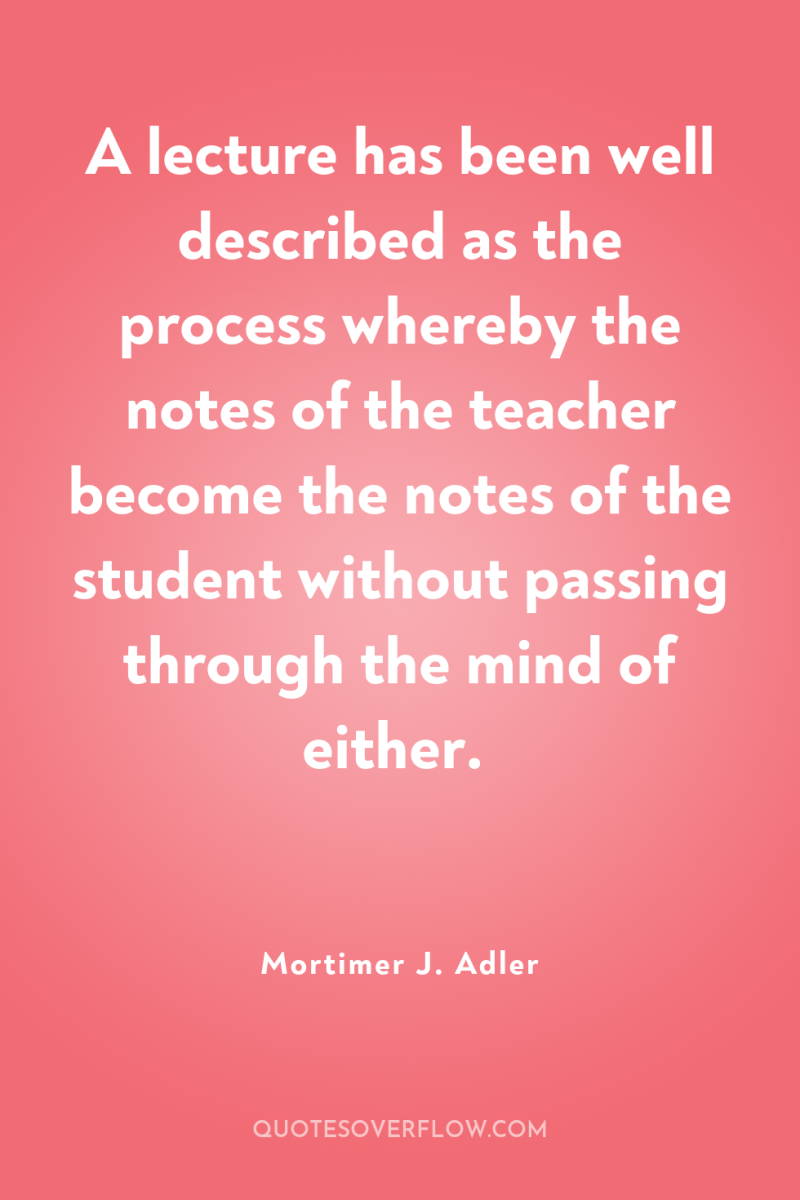
9
A lecture has been well described as the process whereby the notes of the teacher become the notes of the student without passing through the mind of either.Mortimer J. Adler
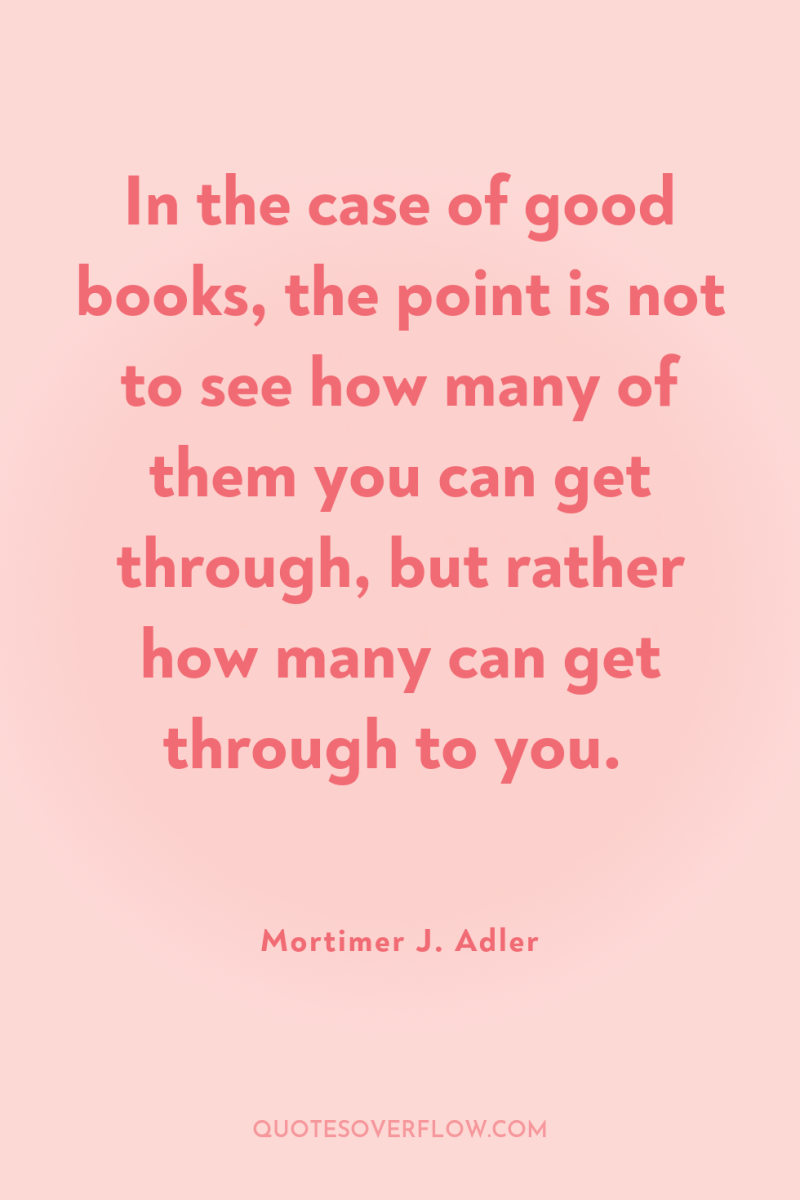
10
In the case of good books, the point is not to see how many of them you can get through, but rather how many can get through to you.Mortimer J. Adler
11
Reading list (1972 edition)[edit]1. Homer — Iliad, Odyssey2. The Old Testament3. Aeschylus — Tragedies4. Sophocles — Tragedies5. Herodotus — Histories6. Euripides — Tragedies7. Thucydides — History of the Peloponnesian War8. Hippocrates — Medical Writings9. Aristophanes — Comedies10. Plato — Dialogues11. Aristotle — Works12. Epicurus — Letter to Herodotus; Letter to Menoecus13. Euclid — Elements14. Archimedes — Works15. Apollonius of Perga — Conic Sections16. Cicero — Works17. Lucretius — On the Nature of Things18. Virgil — Works19. Horace — Works20. Livy — History of Rome21. Ovid — Works22. Plutarch — Parallel Lives; Moralia23. Tacitus — Histories; Annals; Agricola Germania24. Nicomachus of Gerasa — Introduction to Arithmetic25. Epictetus — Discourses; Encheiridion26. Ptolemy — Almagest27. Lucian — Works28. Marcus Aurelius — Meditations29. Galen — On the Natural Faculties30. The New Testament31. Plotinus — The Enneads32. St. Augustine — On the Teacher; Confessions; City of God; On Christian Doctrine33. The Song of Roland34. The Nibelungenlied35. The Saga of Burnt Njál36. St. Thomas Aquinas — Summa Theologica37. Dante Alighieri — The Divine Comedy;The New Life; On Monarchy38. Geoffrey Chaucer — Troilus and Criseyde; The Canterbury Tales39. Leonardo da Vinci — Notebooks40. Niccolò Machiavelli — The Prince; Discourses on the First Ten Books of Livy41. Desiderius Erasmus — The Praise of Folly42. Nicolaus Copernicus — On the Revolutions of the Heavenly Spheres43. Thomas More — Utopia44. Martin Luther — Table Talk; Three Treatises45. François Rabelais — Gargantua and Pantagruel46. John Calvin — Institutes of the Christian Religion47. Michel de Montaigne — Essays48. William Gilbert — On the Loadstone and Magnetic Bodies49. Miguel de Cervantes — Don Quixote50. Edmund Spenser — Prothalamion; The Faerie Queene51. Francis Bacon — Essays; Advancement of Learning; Novum Organum, New Atlantis52. William Shakespeare — Poetry and Plays53. Galileo Galilei — Starry Messenger; Dialogues Concerning Two New Sciences54. Johannes Kepler — Epitome of Copernican Astronomy; Concerning the Harmonies of the World55. William Harvey — On the Motion of the Heart and Blood in Animals; On the Circulation of the Blood; On the Generation of Animals56. Thomas Hobbes — Leviathan57. René Descartes — Rules for the Direction of the Mind; Discourse on the Method; Geometry; Meditations on First Philosophy58. John Milton — Works59. Molière — Comedies60. Blaise Pascal — The Provincial Letters; Pensees; Scientific Treatises61. Christiaan Huygens — Treatise on Light62. Benedict de Spinoza — Ethics63. John Locke — Letter Concerning Toleration; Of Civil Government; Essay Concerning Human Understanding;Thoughts Concerning Education64. Jean Baptiste Racine — Tragedies65. Isaac Newton — Mathematical Principles of Natural Philosophy; Optics66. Gottfried Wilhelm Leibniz — Discourse on Metaphysics; New Essays Concerning Human Understanding;Monadology67. Daniel Defoe — Robinson Crusoe68. Jonathan Swift — A Tale of a Tub; Journal to Stella; Gulliver's Travels; A Modest Proposal69. William Congreve — The Way of the World70. George Berkeley — Principles of Human Knowledge71. Alexander Pope — Essay on Criticism; Rape of the Lock; Essay on Man72. Charles de Secondat, baron de Montesquieu — Persian Letters; Spirit of Laws73. Voltaire — Letters on the English; Candide; Philosophical Dictionary74. Henry Fielding — Joseph Andrews; Tom Jones75. Samuel Johnson — The Vanity of Human Wishes; Dictionary; Rasselas; The Lives of the Poets .Mortimer J. Adler
12
If your friend wishes to read your 'Plutarch's Lives, ' 'Shakespeare, ' or 'The Federalist Papers, ' tell him gently but firmly, to buy a copy. You will lend him your car or your coat - but your books are as much a part of you as your head or your heart.Mortimer J. Adler
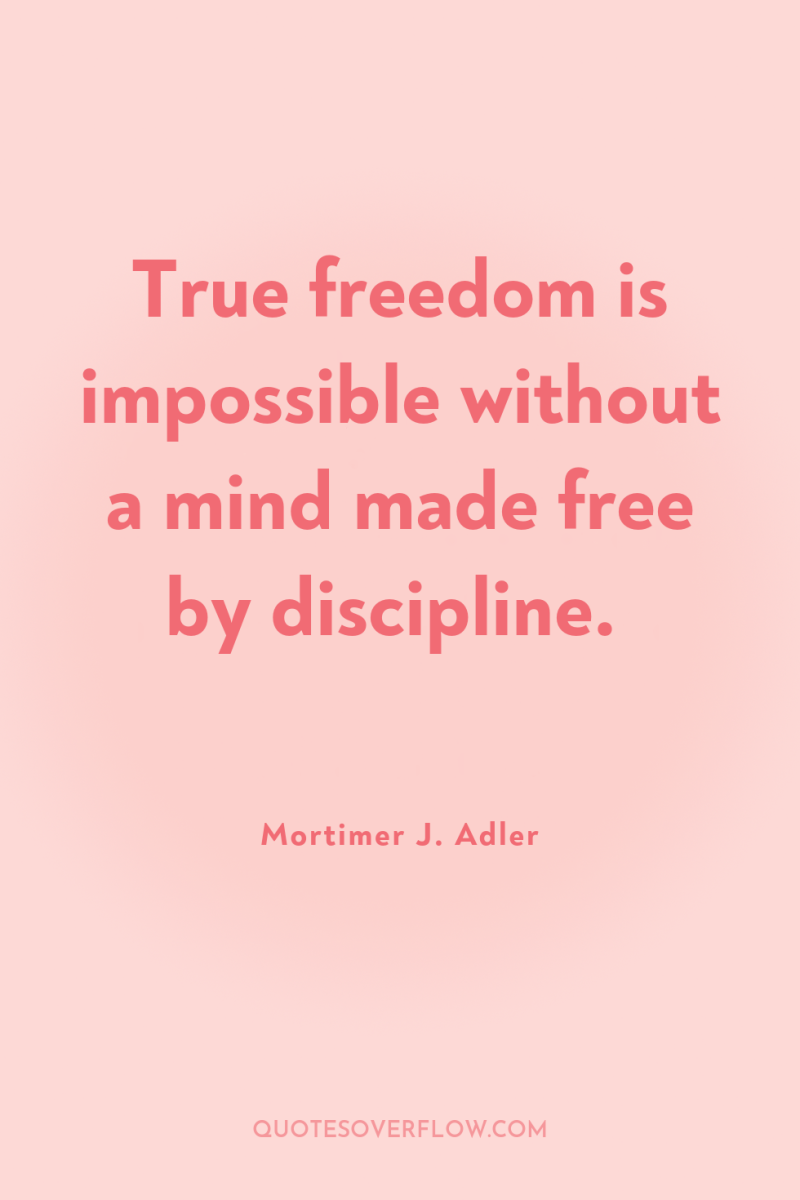
13
True freedom is impossible without a mind made free by discipline.Mortimer J. Adler
14
Reading is a basic tool in the living of a good life.Mortimer J. Adler
15
If a book is easy and fits nicely into all your language conventions and thought forms, then you probably will not grow much from reading it. It may be entertaining, but not enlarging to your understanding. It’s the hard books that count. Raking is easy, but all you get is leaves; digging is hard, but you might find diamonds.Mortimer J. Adler
16
Books are absent teachers.Mortimer J. Adler
17
You will find that your comprehension of any book will be enormously increased if you only go to the trouble of finding its important words, identifying their shifting meanings, and coming to terms. Seldom does such a small change in habit have such a large effect.Mortimer J. Adler
18
The student can read as fast as his mind will let him, not as slow as his eyes make him.Mortimer J. Adler
19
Don't try to resist the effect that a work of imaginative literature has on you.Mortimer J. Adler
20
The reader who fails to ponder, or at least mark, the words he does not understand is headed for disaster.Mortimer J. Adler
21
From your point of view as a reader, therefore, the most important words are those that give you trouble.Mortimer J. Adler
22
Most of us are addicted to non-active reading. The outstanding fault of the non-active or undemanding reader is his inattention to words, and his consequent failure to come to terms with the author.Mortimer J. Adler
23
The mind can atrophy, like the muscles, if it is not used.Mortimer J. Adler
24
In short, we can only learn from our "betters".Mortimer J. Adler
25
What reaches the heart without going through the mind is likely to bounce back and put the mind out of business.Mortimer J. Adler
26
Mathematics is one of the major modern mysteries. Perhaps it is the leading one, occupying a place in our society similar to the religious mysteries of another age. If we want to know something about what our age is all about, we should have some understanding of what mathematics is, and of how the mathematician operates and thinks.Mortimer J. Adler
27
You must be able to say "I understand, " before you can say "I agree, " or "I disagree, " or "I suspend judgment.Mortimer J. Adler
28
... a practical problem can only be solved by action itself. When your practical problem is how to earn a living, a book on how to make friends and influence people cannot solve it, though it may suggest things to do. Nothing short of the doing solves the problem. It is solved only by earning a living.Mortimer J. Adler
29
Enlightenment is achieved only when, in addition to knowing what an author says, you know what he means and why he says it.Mortimer J. Adler
30
The reader tries to uncover the skeleton that the book conceals. The author starts with the skeleton and tries to cover it up. His aim is to conceal the skeleton artistically or, in other words, to put flesh on the bare bones. If he is a good writer, he does not bury a puny skeleton under a mass of fat; on the other hand, neither should the flesh be too thin, so that the bones show through. If the flesh is thick enough, and if the flabbiness is avoided, the joints will be detectable and the motion of the parts will reveal the articulation.Mortimer J. Adler
31
We are not told, or not told early enough so that it sinks in, that mathematics is a language, and that we can learn it like any other, including our own. We have to learn our own language twice, first when we learn to speak it, second when we learn to read it. Fortunately, mathematics has to be learned only once, since it is almost wholly a written language.Mortimer J. Adler
32
... always keep in mind that an article of faith is not something that the faithful assume. Faith, for those who have it, is the most certain form of knowledge, not a tentative opinion.Mortimer J. Adler
33
The trouble is that many people regard disagreement as unrelated to either teaching or being taught. They think that everything is just a matter of opinion. I have mine, and you have yours; and our right to our opinions is as inviolable as our right to private property. On such a view, communication cannot be profitable if the profit to be gained is an increase in knowledge. Conversation is hardly better than a ping-pong game of opposed opinions, a game in which no one keeps score, no one wins, and everyone is satisfied because he does not lose - that is, he ends up holding the same opinions he started with.Mortimer J. Adler
34
The telephone book is full of facts but it doesn't contain a single idea.Mortimer J. Adler
35
In the case of good books the point is not to see how many of them you can get through but rather how many can get through to you.Mortimer J. Adler